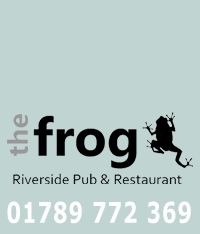


Local Sponsors
-
The Frog.
Riverside Pub and Restuarant. 65 High Street, Bidford-on-Avon, Warwickshire B50 4BG
The Frog is situated on the river Avon between Stratford and Evesham, it has two traditional bars and dining room, serving real ales, fine wines in front of a cosy open fire in winter and with beautiful riverside views from both the dining room and beer garden in summer. Jillian and Harvey took over the pub in late 2014 and have steadily given the place a new lease of life with a refurbishment to a light and fresh atmosphere.
-
Avon Navigation Trust
Mill Wharf, Mill Lane Wyre Piddle WR10 2JF
The navigable river Avon runs from Alveston Weir above Stratford-upon Avon, for 47 miles, winding it's way through the Warwickshire, Worcestershire, and Gloucestershire countryside, down to Tewkesbury where it joins the river Severn.
-
The Severn Rivers Trust
Unit 3, Hope House Farm Barns, Hope House Lane, Martley. WR6 6QF
An independent environmental charity established to secure the preservation, protection, development and improvement of the rivers, streams, watercourses and water bodies in the Severn catchment.




